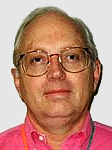
George Cox,
Researcher
Intel, Computing Platforms
Hillsboro, Oregon
“Trustworthy Platforms: Problems, Promises, Concepts, Practical Realities and Research Opportunities”
Bio:
George Cox is strategist/architect with multiyear focus on use of security technologies to solve trustworthy platform and distributed system problems. George's current responsibilities center on defining and driving several of Intel’s security and manageability initiatives. During his 29-year career at Intel, George has played a variety of leadership and management roles across a range of technology, product, academic, and business development programs aimed at creating innovative solutions to system level problems.
Examples include: The Trusted Research Platform program including work with the Trusted Computing Group (TCG), Security Enhanced Linux (SELinux), and early hardware security efforts leading to Intel's LaGrande Technology program; The Common Data Security Architecture (CDSA) program - an Open Group standard with worldwide open source reference distribution via SourceForge; The Tamper Resistant Software program; Intel Architecture Lab's initial Internet program resulting in the initial http://www.intel.com Web site; The iWarp systolic array supercomputer program (jointly funded by Defense Advanced Research Projects Agency (DARPA) /Carnegie Mellon University (CMU) )/Intel); The follow-on Super Computer InterConnect program which developed the communication interconnect for the Intel TFLOPS supercomputer; The iAPX-432 program; and Consultation on numerous Intel Capital pre-IPO investments. George holds MS and PhD degrees in Computer Science from Purdue University and a BA degree in Mathematics from the University of Texas, Austin. George is based at Intel's facility in Hillsboro, Oregon.
FEBRUARY 2nd, 2006 - 4:40 pm cst
TAYLOR HALL, Room 3.128
Department of Computer Sciences
The University of Texas at Austin
Abstract:
Our computing platforms, from cell phones to servers, find themselves under ever more aggressive and tenacious attack. As we continue to become more dependent on these platforms in our daily lives, we naturally want to be able to trust that they will not fail under these attacks. Building a basis for being able to trust the robustness of our computing platforms is the subject of this talk. Topics covered will include the problems, promises, concepts, practical realities, and research opportunities in the Trustworthy Platform arena. Of particular interest are methods for dealing with legacy, system integration, and manageability issues.